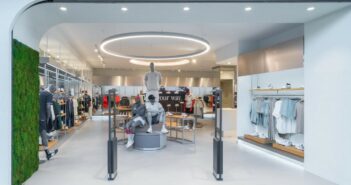In 2021, France hosted a record number of international investment projects, up 24% compared with 2020. For the third consecutive year the country remains in first place in Europe in terms of hosting international investments and raising capital for start-ups that create jobs, according to the EY barometer on the attractiveness of France.
Start-up growth has been boosted by France’s strong reputation and the ability to raise capital for start-ups has further enhanced the market.
Valentin Buffet, startup program manager, Business France, says: “For about five years, we have noticed a real evolution of the retail sector in the world but also in France. If the customer experience is still relevant, it is the digital facet that has taken the lead these last years. Beyond the metaverse or Web3, it is the connectivity of in-store systems that has seen the most evolution in France. And it is a success since Adyen estimates that 70% of merchants who have connected their systems have experienced growth in 2021.”
He believes the post-pandemic period has accelerated this transformation and more Digital Native Vertical Brands (DNVBs) are appearing, with 145 new companies in France in 2022.
“Over the past year we have begun to notice a backward movement of DNVBs when it comes to physical stores. Several of them, especially in the US, are starting to reduce their physical presence to focus on online,” he adds.
Buffet says: “Payment is another rapidly changing component of retail. Sunday, Swile, Alma are among startups that are changing the retail landscape with their payment solutions. The shopping centre landscape is also changing. For several years, Unibail-Rodamco-Westfield has been looking at the new expectations of consumers, seeking to compensate for the decline in the number of visitors, but also for the economic problems that are reducing the purchasing power of consumers.”
The major locations in France for the innovation include Station F in Paris, EuraTechnology in Lille, Atlanpole in Nantes and Accelerateur M in Marseilles. In parallel, some private companies have opened innovation centres, such as Credit Agricole with Village by CA or the Française des Jeux in partnership with Paris & Co. Lafayette Plug & Play and POPAI France are two of the most influential.
Buffet points out: “French Tech raised more than €11bn in 2021. If 2022 is less prolific, we are still seeing historical record fundraising. Exotec has become the first unicorn in the industry sector and Contentsquare raised €600m in July.”
To access these amounts, several structures exist. Business France helps startups to go international but does not necessarily work on the financing – The Public Investment Bank (BPI) is in charge of this, with more than 1,000 companies in its portfolio.
Typically, an innovation manager will identify the company’s needs and propose appropriate investment solutions while Business France, through the Export Recovery Plan, helps with the finance element of international strategies and to help develop new markets. Furthermore, the French Government helps with advantageous tax measures and specific financial support, while more than 1,000 private businesses in France finance startups.
“There are inevitably complicated moments, but the sector is always moving forward,” says Buffet. “The creation of new startups shows the global dynamism of innovation in France which was a political will but also a real geopolitical strategy, with a strong and constantly growing ecosystem.”
MAPIC will once again be running its Innovation Forum, with a host of exhibitors and conference sessions in Cannes, and to learn more about start-up growth strategies and how to raise money for start-ups and fund raising for start-ups approaches, MAPIC spoke to two innovation players in the French retail real estate market.

Vincent Bryant, Deepki
MAPIC: Can you explain what Deepki does?
Vincent Bryant, CEO and co-founder, Deepki: Deepki’s scalable SaaS platform enables clients to collect ESG data, get a comprehensive overview of their portfolio’s ESG performance, establish pathways, assess their performance and report to key stakeholders, facilitating their transition to net zero. The platform is supported by carbon and ESG experts who partner with clients across data collection and analysis, through to ESG strategy definition and implementation.
MAPIC: How can retail landlords/developers use technology to improve sustainability and services?
VB: Landlords and tenants can use technology to harness a vast amount of under-exploited data, which will allow them to make informed decisions, put in place comprehensive strategies to meet their net zero targets and, importantly, measure the impact of capital expenditure. By projecting pathways, we can estimate the impact of actions taken on a portfolio in years to come, predicting when an asset or a portfolio will reach net zero, or when it risks obsolescence.
MAPIC: How can innovation create commercial and community connections?
VB: Innovation creates commercial and community connections by facilitating communication between stakeholders and industry players who share a common goal. Collaborative platforms, such as Deepki Ready, facilitate data collection and exchange, allowing all parties to gain a complete vision of, for example, their ESG performance. Benchmarking against peers allows companies to compare themselves to industry norms, something which is becoming increasingly important with the introduction of regulations such as the Sustainable Finance Disclosures Regulation (SFDR). The real estate industry is responsible for 37% of carbon emissions, and while it is important that companies take action individually, this is an industry-wide issue and realistically, will only be solved by a collective effort, with all players coming together to act for the good of the planet.
MAPIC: You recently raised €150 million. How do you plan to use these funds?
VB:It was the real estate industry’s largest ever SaaS Climatech fundraising and this will help us to consolidate our leadership position in Europe by growing our current teams and opening more offices, as well as establishing ourselves in the US within the next 12 months. Our ambitious hiring plan will see us hit 800 employees in 2023, and we also plan to carry out strategic acquisitions, starting with our main UK competitor, Fabriq, which we announced in June. Deepki has enjoyed 100% year-on-year growth since 2019 and we are confident that this trend will continue well into 2023 and beyond, as we benefit from the real estate sector’s increasing focus on improving ESG performance and combating climate change.

Ismael Ould, president, Anycommerce
MAPIC: Can you explain what Anycommerce does?
Ismael Ould, president, Anycommerce: Anycommerce is a SaaS that is built to accelerate commerce transformation, or at least evolution. We are an omni-channel platform that provides all what retailers may need in topics like cash-in, fulfilment, loyalty and promotion.
MAPIC: How can retail landlords/retailers use technology to improve on-site payment?
IO: In so many ways…with our solution, retailers can apply all the cash-in journeys that exist, especially the most recent ones: self-checkout; MPOS (mobile points of sale); e-command in store; and remote payment. But they can also operate classic actions like order taking, discounts, shift records, all kinds of payments, omni-channel basket (the possibility to put the current basket on hold and retrieve a pending order started on another POS), refunds, user management, unified back office, etc. Anycommerce POS is natively created to unify and manage all the cash-in journeys in one open API platform.
MAPIC: How can innovation help create commercial and community connections?
IO: Since we are a complete solution, our fidelity strategy can be summarised as ‘actionable insights for better engagement.’ For example, with our smart coupon delivery tools, we create more than 100 billion different and personalised, offers for retailers’ loyalty programmes. Then, retailers can create marketing campaigns and personalised client communication across all channels: physical and digital. We also strongly believe in the power of client segmentation, gamification and social networks. And we provide a unique platform to manage multi-programme and brand capabilities. The goal is always the same: increase the lifetime value of the customers.
MAPIC: Can technology create new services for visitors?
IO: Absolutely. Technology has allowed thousands of retailers to offer a next level in-store experience to millions of customers. For example, the mobile POS can totally cut the time that the customers have to go through the checkout counters. It also helps the retailer to close the sales especially for items at high prices and eliminate the time that customers might change their mind. Retailers can guarantee their customers obtain every item of their orders even if these very items are not available in the same store or warehouse, thanks to our powerful and configurable order dispatching algorithm.
Then, with a substitution system during preparation, retailers can benefit from a minimised rate of missing items. Or a rapid provision of the order to the customer, thanks to the verification of the availability of human and material resources.
MAPIC: You recently raised more funding?
IO: If we are profitable today, we needed investments to achieve our ambitions. Indeed, at the beginning of our history, we sought capital in advance of the phase to build the platform and thus sign our first customers. More recently, we got funded in order to accelerate the product roadmap and therefore became effective and faster in helping our retail clients to grow further.



